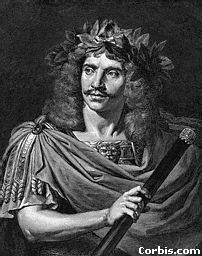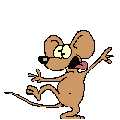* comedy & acting
* comedy & directing
* comedy & film
* comedy & dramaturgy
...
|
2009 : PRINT pages
* comedy & acting * comedy & directing * comedy & film * comedy & dramaturgy
...
|
|
"Theatre is not a mirror but a magnifying glass." Mayakovsky
[ advertising space : webmaster ] text LINKS Sister-page -- Comical. Back to Playscript Analysis For 2005: Pygmalion DVD * Play * My Fair Lady (script) * My Fair Lady DVD * Plays by Shaw * Sayings of George Bernard Shaw *
vtheatre.net
Key Terms: Glossary
|
 |
| From Playwrights |
Comedy (genre) -- Theory
Comedy Acting (monologues & scenes)
Directing Comedy (shows) :
Shakespeare (Shrew), Chekhov (4 Farces), Beckett (Godot), Stoppard (R/g) ...
Postmodern comedy

Oscar Wilde has nothing to do with the music on this page. I had a limited choice, sorry. If you are an actor, go for Acting Comedy. If you are in my class, you have to study this page (and the plays: Acting One -- The Importance of Being Earnest, Acting Two -- 12th Night and Mikado, Acting Three -- The Three Sisters, Chekhov thought it's a comdedy, too).Tragicomedy is more than just a play that has serious and comic elements. It is a play in which the fundamental and deeply disturbing themes of tragedy are dealt with in a tone that varies between serious and humorous. It is the most difficult form to appreciate since the shifts between its two modes leave the audience feeling unsteady and uncertain. It is viewed by some as the quintessential form of twentieth century drama, dealing as it does with themes of moral uncertainty, loneliness, and alienation. There is little relief through laughter, catharsis, or happy ending. On stage, Theatre of the Absurd is its most obvious manifestation.The picture also has almost nothing to do with The Importance of Being Earnest. Good play. I am surprised that not everybody knows this comedy which is the mother of all British and our sitcoms.
[THR413 Playscript Analysis is the play where we talk about "Comedy as genre." I'm thinking about changing the title -- Performance Theories"! Then I can get more into what is "comical" -- Bergson, Bakhtin, for example.]
Wilde is not as simple as they think. But this subject is for our later discussion. Our prime interest in his script -- language! Remember the first category in TEXTURE (Aristotle)?
But what is comedy? Well, go back to tragedy page (the Greeks). Laughter -- said the Philosopher. Our comic hero is below "everage man" -- his problems have solutions, which only he doesn't see (we do). Therefore comedies start with troubles and have happy ends (ABCV of composition).
For me comedy starts only with Shakespeare or Gozzi. No Greeks or Romans, thank you very much. We are getting better and better with comedy. Perhaps we threw all our energy into it and have not many good dramas and no tragedies at all!Repetition! Bergson said. (All images on the page!) The comic effect is produced by mechanical repetition, which is un-natural for us!
Is it funny? I guess, that's why somebody made it and I took it. So, what makes it comical? Or maybe I should ask -- what makes it NON-TRAGIC? Oh, that's interesting. According to Aristotle, any comic conflict from the start has its resolution (it's always "social" -- between the mortal folks). We see it, but the stupid people in the story don't. "Comedy of Errors"! We laugh because we UNDERSTAND. Comedy is a very mental activity. We like to see somebody more stupid than we are, don't we? We laugh at them, they make the same mistake over and over (repetition) and they never learn! They never change! Like us.
Comedy is extremely social (read Aristotle's "The Poetics"). This animation won't make next generation laugh. Comedy embeds itself in historical times and references of the present day.
Did you notice something else? The extremes! It has to go overboard in order to make us laugh. Unexpected (conflicting) moves? Good! Slapstick Comedy, Physical Comedy, Clowns! More!
Comedy must be primitive. Even sophisticated comedy. Wilde knows it. Two guys, two girls. Comical pairs, partners (see Doubling in Spectator Theory). Tragedy loves unique, single, isolated. Persona and Individual rule the dramatic. Type and Stock govern the comedy.
If you want us understand, we have to RECOGNIZE! We have to see something we already saw before, the known. Even well-known (satire). Oh, yes, this is my neighbor! We recognize that girls and boys will play the game. Errors! More, please!
I should have Commedia D'Arte page! For now read Biomechanics and/or 12th Night files.
[ showcase for BioMethod -- Acting One ]
Oscar Wilde
1854 - 1900 -- Read WWWilde archives!The Importance of Being Earnest
1895 : See WWWilde DirectoryThe best book on nature of comedy: Michail Bakhtin (heavy reading, but it will serve you for life).
PS
I use four (comedy) plays for my classes: Mikado, 12th Night, Inspector General, The Importance of Being Earnest (all copyright free and online): monologues and scenes. Compare them!Mono Studies: Modern
HIGGINS: There! That's all you'll get out of Eliza. Ah-ah-ow-oo! No use explaining. As a military man you ought to know that. Give her her orders: that's enough for her. Eliza: you are to live here for the next six months, learning how to speak beautifully, like a lady in a florist's shop. If you're good and do whatever you're told, you shall sleep in a proper bedroom, and have lots to eat, and money to buy chocolates and take rides in taxis. If you're naughty and idle you will sleep in the back kitchen among the black beetles, and be walloped by Mrs. Pearce with a broomstick. At the end of six months you shall go to Buckingham Palace in a carriage, beautifully dressed. If the King finds out you're not a lady, you will be taken by the police to the Tower of London, where your head will be cut off as a warning to the other presumptuous flower girls. If you are not found out, you shall have a present of seven-and-sixpenxce to start life with as a lady in a shop. If you refuse this offer you will be a most ungrateful wicked girl; and the angels will weep for you. [To PICKERING.] Now are you satisfied, Pickering? [To MRS. PEARCE.] Can I put it more plainly and fairly, Mrs. Pearce? (Shaw, Pygmalion, Act II) Farce is a grotesque exaggeration of comedy. In comedy truth is central, in farce it is incidental. Where comedy is rooted in reality, farce throws logic and probability out the window. Where comedy draws its characters from life, farce takes its from the circus. Farce relies more on physical rather than intellectual humor, and all elements (especially plot and character) are grossly exaggerated for comic effect. In comedy humor is used in the service of truth, in farce humor is used for its own sake. The purpose of farce is to create big laughs as often as possible without any pretense of meaning or message.Farce probably developed before comedy as we have defined it, thus many comedies have some elements of farce. It is simple and direct without literary pretensions. The plots can be very complicated and result in the confusion of the characters for our amusement. It is said that the expression "there is nothing new under the sun" applies particularly well to comedy. The term "stock" in the theatre refers to successful things that are kept and reused--a kind of recycling. Stock plots, usually involving such elements as misunderstandings, disguises, hiding and chases; and stock characters that are cartoonish exaggerations of real people abound in farce. There is an abundance of physical humor which runs the gamut from such sight gags as spilling a drink, to slips and falls, and finally to physical assault. One of the conventions of comedy is that the audience accepts that no real harm results from such mock violence. This kind of humor is also referred to as slapstick and low comedy. A slapstick is a double-slatted paddle that makes an exaggeratedly loud noise when used; it originated in a seventeenth century Italian form of farce called commedia dell'arte. Low comedy is used to distinguish farcical humor from the more literary and intellectual humor of high comedy. Examples of farce abound, especially in the film comedies of the silent era such as the Keystone Kops, but also in the sound films of the Marx Brothers, Laurel and Hardy, and The Three Stooges. Also, most television cartoons and many sitcoms are pure farce. Stage farces are more rare today since physical humor can be more believably and safely handled on camera. The few exceptions are mostly British; plays such as Joe Orton's What The Butler Saw, and Michael Frayn's Noises Off. Vulgar and bathroom humor find a comfortable home in farce. Recent films such as American Pie and the cartoon-turned-movie South Park exemplify this fact." http://homepage.mac.com/roberthuber/school/1delec12b.html

Musicals are part of a larger grouping called musical theatre: theatrical art which includes substantial rather than incidental use of music and dance. Other forms of musical theatre include opera, operetta, and musical revues. Musicals are the most popular form of theatre today, and as such will be discussed more fully on their own.
vTheatre: pomo project'06 * my yahoo: theatre
![]()








 Film-North * Anatoly Antohin * eCitations
Film-North * Anatoly Antohin * eCitations
© 2005 by vtheatre.net. Permission to link to this site is granted. books.google.com + scholar.google.com
cite: anatoly antohin. URL + date [ my shows : 1. writer * 2. director * 3. dramaturg * 4. actor ]